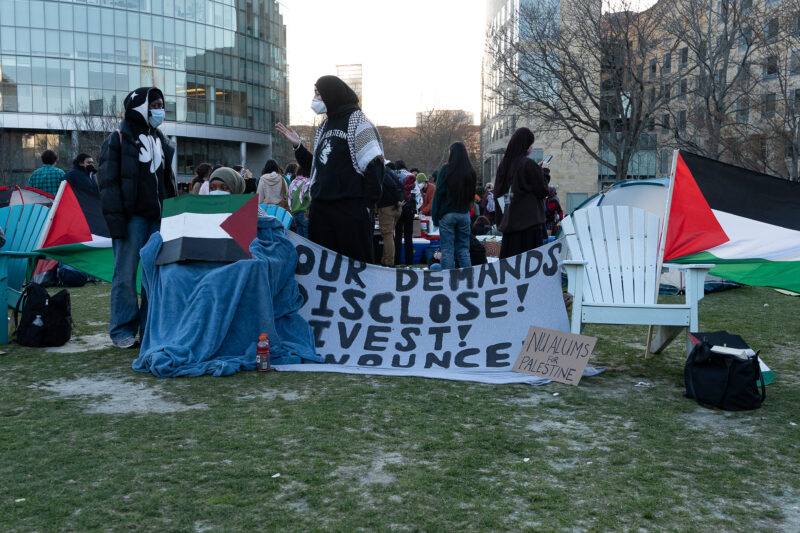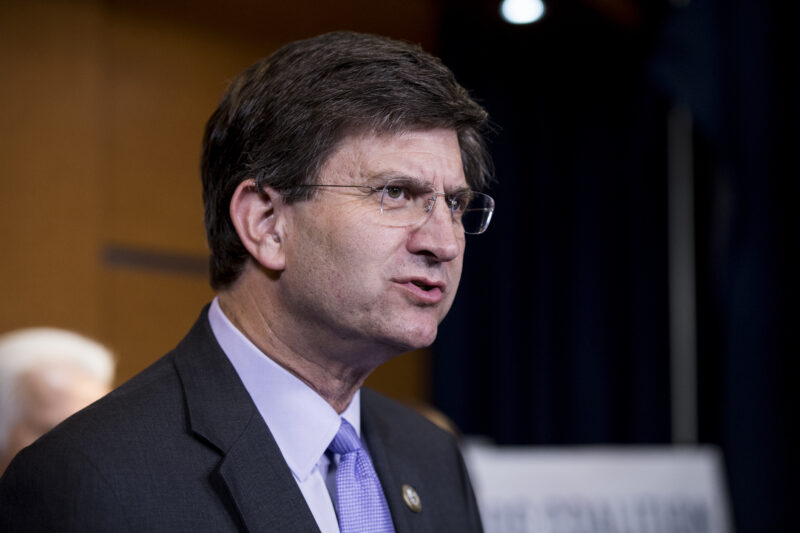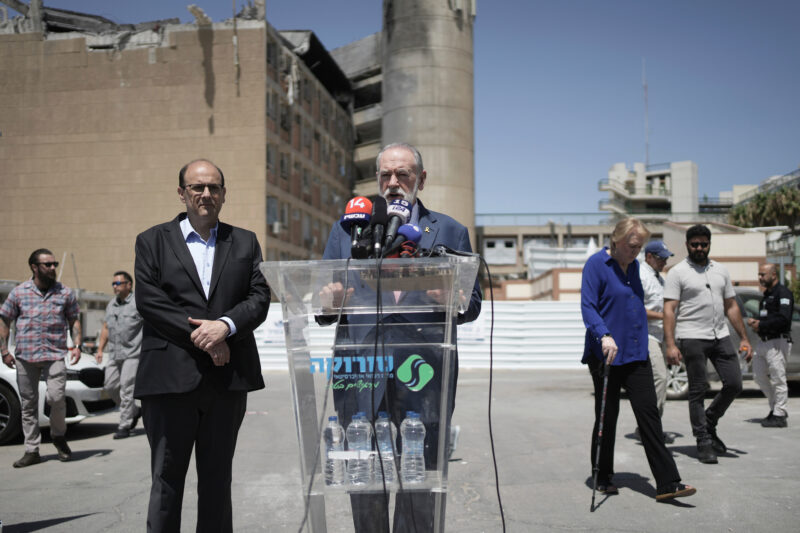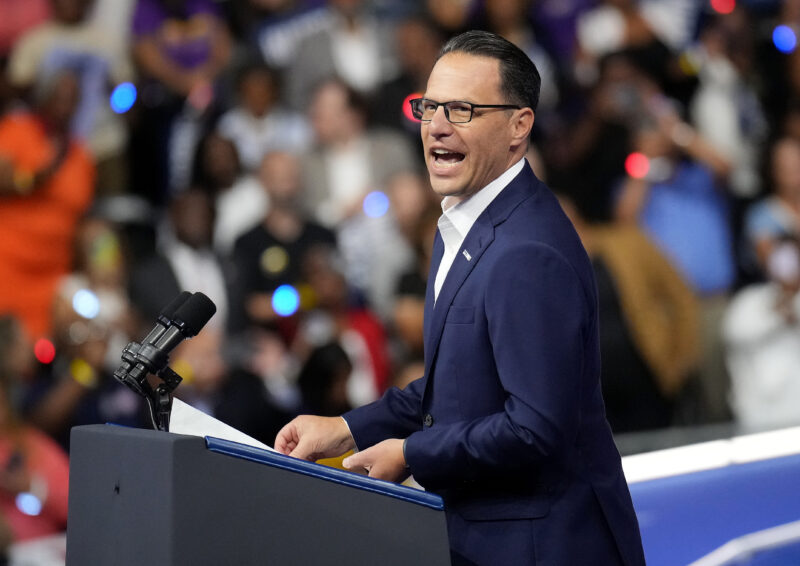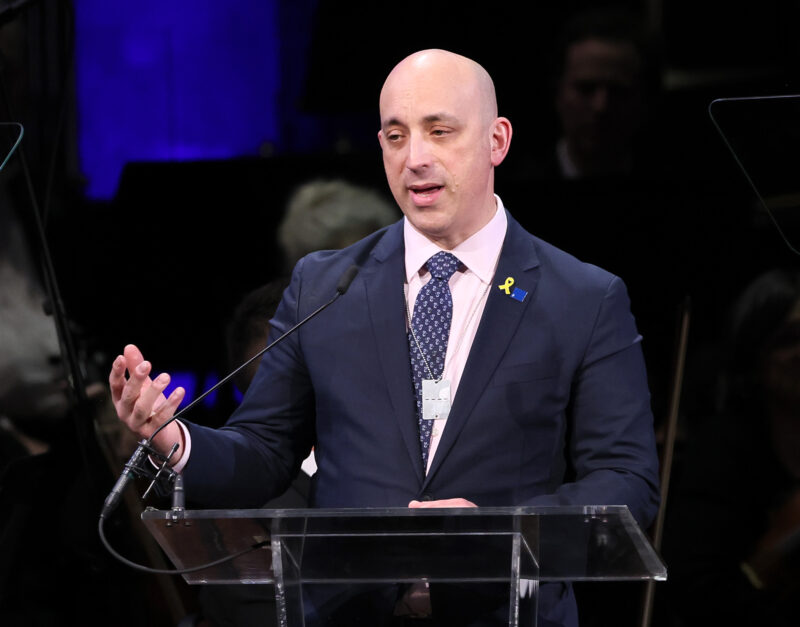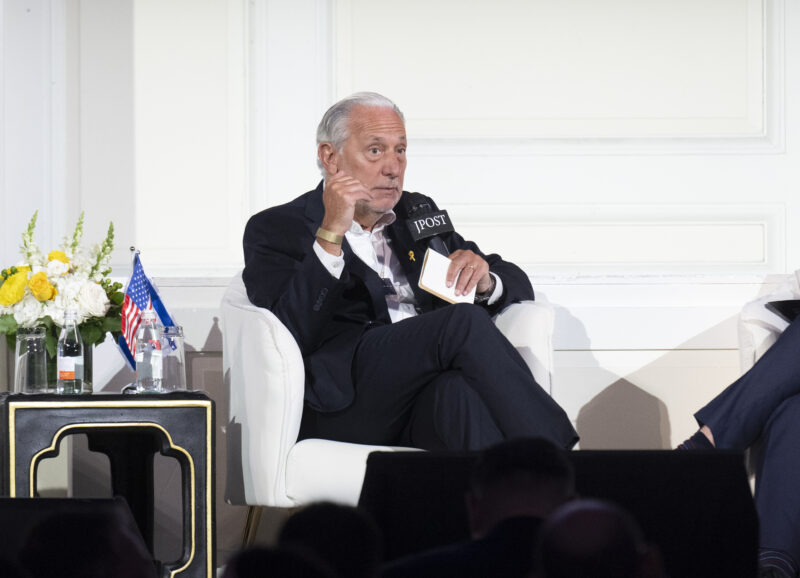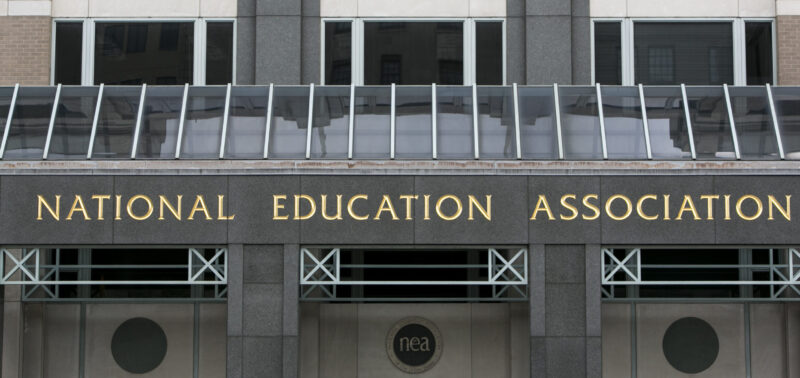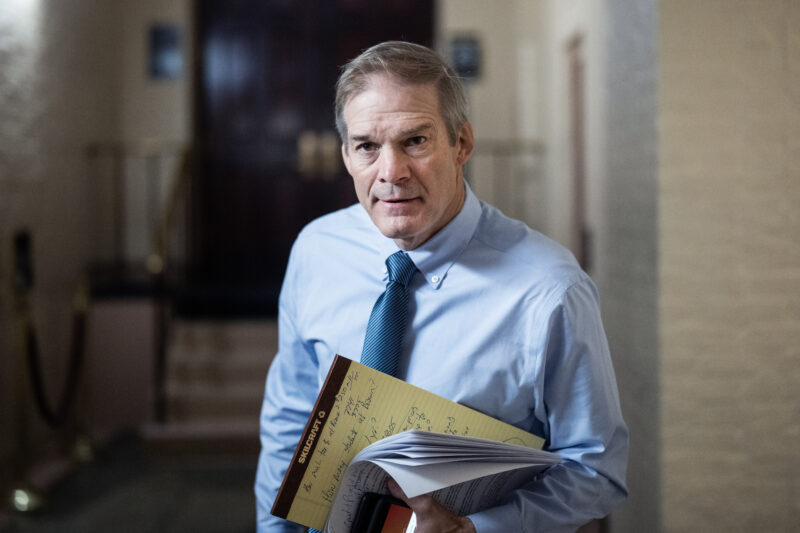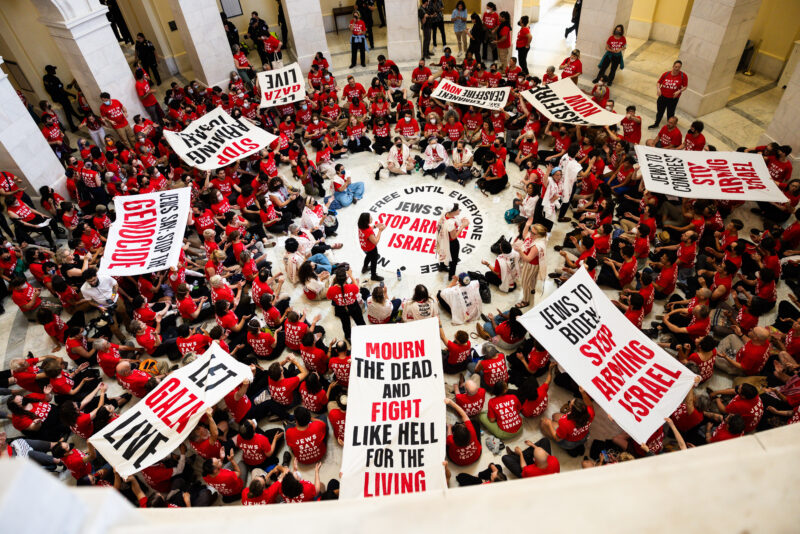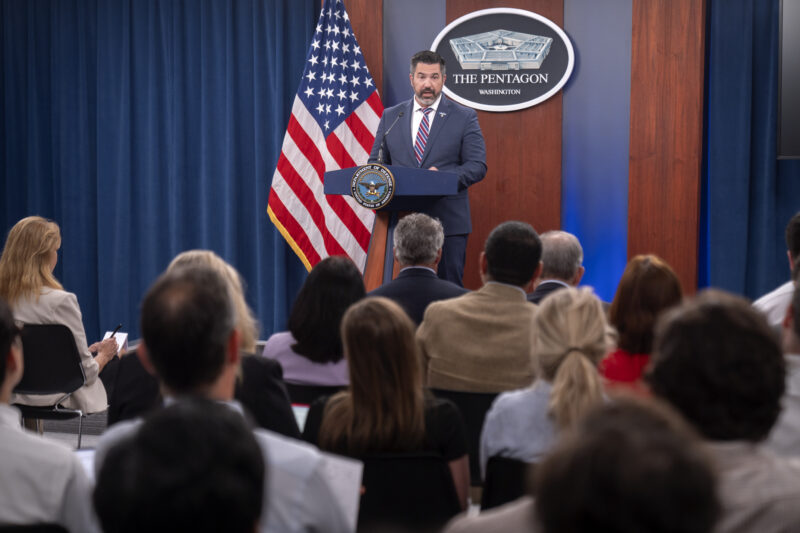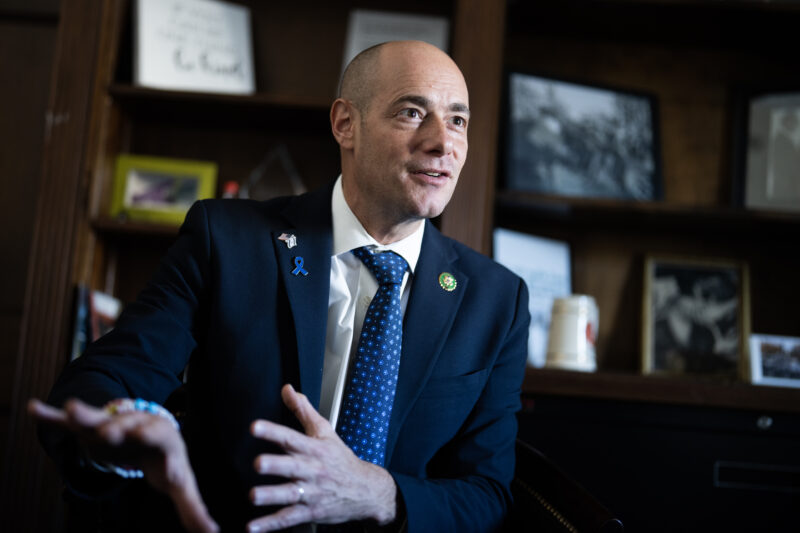Middle East envoy Steve Witkoff appeared to confirm this week that the U.S. had already lifted some oil sanctions on Iran

Kayla Bartkowski/Getty Images
Sen. John Cornyn (R-TX) speaks with press in the Hart Senate Office Building on April 07, 2025 in Washington, DC.
Two Senate Republicans are urging the administration against lifting any sanctions on Iran in absence of real concessions from the regime, following comments from Middle East envoy Steve Witkoff indicating the U.S. had already rolled back some sanctions.
Witkoff, speaking on CNBC on Wednesday, appeared to confirm that President Donald Trump had lifted some oil sanctions on Iran this week, as a signal of cooperation to China and Iran. Trump also said at the NATO summit that Iran would “need money to put that country back into shape. We want to see that happen,” adding, “If they’re going to sell oil, they’re going to sell oil.”
The comments came after Trump posted on Truth Social earlier this week, “China can continue to purchase Oil from Iran” — comments that a senior White House official said did not indicate any policy shift or sanctions relief.
Sen. James Lankford (R-OK) told Jewish Insider he had heard Trump and Witkoff’s comments and that he was not sure what they were referring to, but said no sanctions should be removed until Iran ends its support for terrorism and guarantees that International Atomic Energy Agency inspectors have access to facilities in Iran.
“We’re trying to get additional details, because we’re hearing the sanctions are still there, as well they should be. They still have acts of terrorism. Until we can actually verify that they’ve actually set aside planting terrorism around the region, we need to continue to be able to put pressure on them,” Lankford told JI.
He said the U.S. should not be removing any sanctions at this point, noting, “We can’t verify anything on the ground yet. … They’re literally trying to be able to block out the future [International Atomic Energy Agency] certification,” referring to an Iranian parliament effort to block IAEA inspectors from Iran going forward.
“We know they don’t have the power and the ability to be able to highly enrich uranium at this point, but we don’t have the ability, still, to be able to verify things on the ground,” Lankford continued. “And we have no shift in their policy, as far as we can tell — and certainly not in their charter — on what their stand is for terrorism in the region and to us.”
Sen. John Cornyn (R-TX) said that sanctions relief should “[depend] on what we get for it. If we get complete denuclearization and a peace between Israel and Iran, that might be worth talking about.”
He said that the U.S. should not remove any sanctions preemptively.
“We should get something for it. Certainly, Iran is back on its heels now, and this is exactly the right time to negotiate some sort of long-standing arrangement,” Cornyn said. “I wouldn’t do anything preemptive.”
Islamic Studies Professor Jonathan Brown: ‘I’m not an expert, but I assume Iran could still get a bomb easily. I hope Iran does some symbolic strike on a base’

Celal Gunes/Anadolu via Getty Images
Georgetown University students take part in a campus protest against the ongoing Israeli attacks on Gaza in Washington, D.C. on April 25, 2024.
Georgetown University administration said it was “appalled” after a prominent faculty member called for Iran to conduct a “symbolic strike” on a U.S. military base in a social media post on Sunday.
“We are reviewing this matter to see if further action is warranted,” a spokesperson for the university told Jewish Insider on Monday, noting that the administration is “appalled” by the since-deleted tweet by Jonathan Brown, a tenured professor and chair of the university’s Department of Arabic and Islamic Studies and Alwaleed bin Talal chair of Islamic Civilization in the School of Foreign Service, who has a history of spreading anti-Israel vitriol.
On Sunday, one day after the U.S. struck three Iranian nuclear facilities, Brown tweeted: “I’m not an expert, but I assume Iran could still get a bomb easily. I hope Iran does some symbolic strike on a base, then everyone stops.”
Brown, who is the son-in-law of convicted terror supporter Sami Al-Arian and has gone on several X tirades since the Oct. 7, 2023 terrorist attacks slamming Israel — including calling the country “insanely racist” — deleted his tweet on Monday, claiming that it was misinterpreted.
“I deleted my previous tweet because a lot of people were interpreting it as a call for violence,” Brown wrote. “That’s not what I intended. I have two immediate family members in the US military who’ve served abroad and wouldn’t want any harm to befall American soldiers… or anyone!”
The condemnation of Brown’s post comes as the House Education and Workforce Committee has called on Georgetown’s interim president, Robert Groves, to testify on July 9 about its handling of campus antisemitism. The funding Georgetown has received from Qatar, in connection with its Qatar campus, has come under intense scrutiny in the wake of Oct. 7.
At a time when some elite universities are acquiescing to the Trump administration’s demands to crack down on antisemitic activity on campus, Georgetown has pushed back. In March, for example, the administration issued statements supportive of Badar Khan Suri, a university professor and postdoctoral scholar who was detained by federal authorities.
The Education Secretary dodged a question from a GOP senator about how cuts to the Office for Civil Rights would impact the fight against antisemitism

BRENDAN SMIALOWSKI/AFP via Getty Images
Secretary of Education Linda McMahon prepares to testify before a House Subcommittee on Labor, Health and Human Services, Education, and Related Agencies hearing on the budget for the Department of Education, on Capitol Hill in Washington, DC on May 21, 2025.
Speaking at a Senate Appropriations Committee hearing on Tuesday, Secretary of Education Linda McMahon laid out the administration’s expectations for campus antisemitism policies, but sidestepped how the administration will execute on those directives while making substantial cuts to the Department of Education’s Office for Civil Rights.
“We’re saying we mean business, these programs and policies have to have teeth, they have to be enforced,” McMahon said.
She outlined a series of policies the Trump administration wants to see campuses enforce, including banning encampments, prohibiting the use of masks and better vetting of students and professors. Professors, she said, must not teach ideology.
She added that the Office for Civil Rights has opened “many cases” on campus antisemitism and is taking enforcement actions, including pulling funds from multiple schools.
But she failed to directly address concerns from Sen. Shelley Moore Capito (R-WV), the subcommittee chair, that cuts to OCR could hamper the administration’s ability to adequately address campus antisemitism.
The firings come as President Trump is looking to centralize foreign policy decision making

J. David Ake/Getty Images
The North Portico of The White House is seen at dusk on April 24, 2025, in Washington, DC.
The top National Security Council officials overseeing the Middle East and Israel and Iran portfolios — seen as pro-Israel voices in the administration — were among the dozens of officials dismissed in a widespread purge of the NSC on Friday, two sources familiar with the situation told Jewish Insider.
Eric Trager, who was the senior director for the Middle East and North Africa — the lead official on the Middle East — and Merav Ceren, the director for Israel and Iran, were both Trump administration political appointees but were pushed out in what one official called a purge of “the Deep State” inside the NSC.
Their firings come as voices skeptical of the U.S.’ role in the Middle East increasingly establish a foothold in the administration, and as President Donald Trump and Secretary of State Marco Rubio, who is also the acting national security advisor, seek to restructure and slim down the key foreign policy-making body.
According to Axios, officials cut from the NSC will be moved to other positions in the government. Ceren previously came under fire from the far left and far right after false claims that she had previously worked as an Israeli Ministry of Defense official generated accusations of dual loyalty.
NSC spokesman Brian Hughes defended Ceren at the time and denied the accusations, describing her as “a patriotic American who has served in the United States government for years, including for President Trump, Senator Ted Cruz, and Congressman James Comer. We are thrilled to have her expertise in the NSC, where she carries out the President’s agenda on a range of Middle East issues.” He said she “was never employed by the Israeli Defense Ministry, let alone was she an Israeli official.”
Trager and Ceren were hired under former National Security Advisor Mike Waltz, who was pushed aside after he added a journalist to an administration group chat about U.S. strikes on the Houthis, and after right-wing provocateur Laura Loomer accused him of staffing the NSC with a host of neoconservatives out of step with Trump.
Trager and Ceren had maintained their positions at the time, even as several of Waltz’s top hires were dismissed.
















